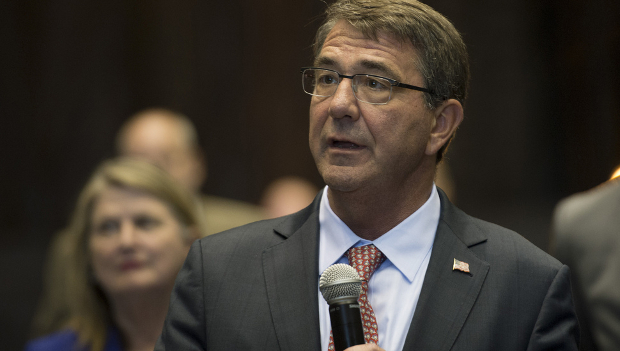The US Department of Defense is teaming with Apple, Boeing, Harvard University and other organisations to develop flexible electronics and sensors that could be placed in uniforms or inside ships and aircraft.
Under the plan, a consortium called the Flexible Hybrid Electronic Institute will work on using 3D printing to build bendable, thin electronics that could match the contours of a person’s body or a military vehicle.
The technology could find its way into soldiers’ uniforms as health monitors or placed in the cramped compartments of a ship or aircraft to measure structural integrity.
But the wearable tech developed by the consortium, whose 162 members include Boeing, Harvard University and Hewlett-Packard, could also have civilian uses. For example, the sensors could be used to develop medical devices for the elderly.
With the institute, US Secretary of Defence Ashton Carter (pictured) wants to continue improving the relationship between Silicon Valley and the US government.
“I’ve been pushing the Pentagon to think outside of our five-sided box, and invest in innovation, here in Silicon Valley and with companies across the country,” Carter said Friday during a press conference at Moffett Federal Airfield in Moffett Field, California.
“The reality is, we don’t know all the applications this new technology will make possible,” he said.
Google currently leases the NASA-operated Moffett airfield, where research is conducted in emerging technologies including robotics. The new institute will be headquartered in nearby San Jose.
Relations between Silicon Valley and the US government have been strained since Edward Snowden disclosed Internet surveillance and spying programmes in 2013. But the Department wants to strengthen its ties with technology companies and learn from them, partly to improve its own cyber security defences.
In April, Carter visited Stanford University to rebuild trust with the industry and announce new programmes to encourage private citizens to contribute to defence technology projects.
Under the plan announced Friday, which will be managed by the US Air Force Research Laboratory, the US government will contribute $75 million over five years while $90 million will come from companies. Funding for the venture will total more $171 million, with local governments contributing the remaining capital.
Hybrid electronics is just one piece in the US Defense Department’s efforts to collaborate with industry. Carter also visited the headquarters of LinkedIn, to discuss how the department could compete for technology workers.
IDG News Service







Subscribers 0
Fans 0
Followers 0
Followers